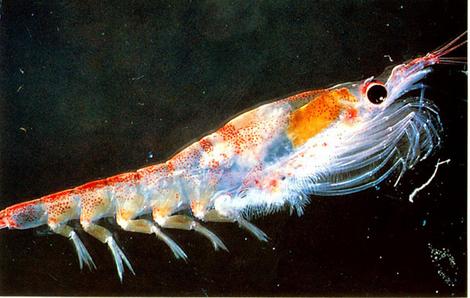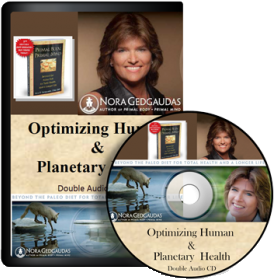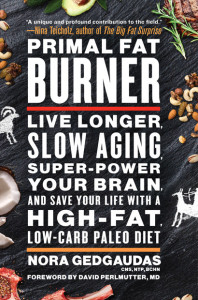 Q: I’ve been taking EPA/DHA Omega 3 supplements since reading David Perlmutter’s excellent Grain Brain and was wondering if it’s safe to give to my kids and if so from what age and how much?
Q: I’ve been taking EPA/DHA Omega 3 supplements since reading David Perlmutter’s excellent Grain Brain and was wondering if it’s safe to give to my kids and if so from what age and how much?
A: You may not know this, but Dr. David Perlmutter’s book Grain Brain was almost entirely inspired by my book Primal Body, Primal Mind. David shared this with me quite a long time ago. I consider him a good friend.
I am less of a fan of fish oil these days and much more-so a fan of Antarctic krill oil, for multiple reasons.
For starters, Antarctic krill oil comes from as pristine a water source as is possible for any form of seafood nowadays. The extremely cold water also helps maximize the presence of EPA and DHA, which is actually a bit more concentrated in krill products. Krill is also quite low on the food chain, which makes it less likely to harbor significant concentrations of contaminants. Krill is naturally bound to phospholipids, which allows it to more easily incorporate into your cell membranes and also makes it much more bioavailable than fish oil. In fact, half as much Krill oil does twice what fish oil does. In addition, fish oil is bound to triglycerides and ethyl esters which have to be broken down in your gut to its base fatty acids of EPA and DHA. If you happen to have digestive issues you may not be able to do this very effectively. Finally, antarctic krill oil also contains high levels of an extremely potent and highly beneficial carotenoid known as astaxanthin, which serves as a potent antioxidant and helps stabilize the integrity of the oil and helps prevent oxidation/rancidity.
I have also grown increasingly concerned about the kinds of contaminants that might be present in commercial fish oils, as well as about the processing methods used to extract them. In fact, I am no longer really recommending fish oil for most people for all these reasons.
Animal source omega-3’s (the only form worth supplementing) are actually among the most deficient nutrients in our modern food supply. These are present in 100% organic and fully pastured animal source foods, but if you are suffering from inflammatory, mood-related or cognitive/neurological issues (for starters), then what’s in your diet may not be sufficient to replace what may be deficient. That’s where supplementation comes in. We live in a challenging enough modern-day environment—with sources of inflammation hitting us from all sides—that I think it makes sense for most people (including children) to supplement with it. How much to take is going to be entirely relative to what the state of your health happens to be and whether you are attempting to address any particular issues. A maintenance dose could be just one or two capsules a day. Attempting to address something like, say, bipolar disorder could require 5 to 10 g a day. As with many things, it all depends.
I think that Joe Mercola’s krill oil—which is uniquely manufactured to really protect the oil from oxidation and goes the extra mile for its unique encapsulation process— is a particularly good one. I don’t have any special connection to Mercola, but I do think it’s a great product. You could also look for the one made by Pure Encapsulations. I imagine you could easily find both of these on Amazon.
I hope this helps.
Warmly,
~Nora
Click here to learn more about my Primal Restoration® Certification program!




I use (and sell) a seal oil product from Auum Omegas. It is more effective than any fish oil I’ve ever taken, and has been used in clinical trials to treat diabetic neuropathy with great results. There are some questions about the sustainability of krill fishing, but no real danger of Canadian seal population of becoming endangered.
Dear Reba,
I am certainly intrigued by this, though I see no actual comparison studies between regular fish oil and this seal oil. Also, there is no possible way that a mammalian source of omega-3 supplements is going to be anywhere near as sustainable as krill. Krill is literally THE most abundant biomass organism on the planet, and less than 1 to 2% of it is ever harvested for human use. The sustainability issue just isn’t there. But I would be very interested in any research showing actual differences in absorption and utilization between regular fish oil and seal oil. I assume their main flagship omega-3 product is the Essential D3A. Correct? I am also concerned about the artificially added vitamin A palmitate, which causes me to question the rest of what they carry. Vitamin A Palmitate is typically derived from any combination of vegetable oils such as olive, coconut, canola and/or palm oil. Canada is certainly ground zero for canola oil…but most vitamin A palmitate commercially is derived from palm oil, which is anything but sustainable. And btw, nearly all commercial palm oil is interesterified (a deodorization processing method as bad or worse than hydrogenation). In any case, this form of vitamin A has been artificially added to this product and is not naturally occurring (such as natural mammalian retinol would be from liver). The EPA and DHA levels of this product are anything but impressive, also. Their D product contains more actual Omega-3’s, but I find myself feeling a little bit leery of this company, to be honest. The studies they have sponsored look interesting, but there is nothing in the supplied research to compare the difference between fish-based Omega-3 and their seal oil. And I am actually quite concerned about the idea of slaughtering large numbers of seals just for their oil for a novel, commercially sold oil product. It all seems a little bit “fishy” to me… sorry to say. ~ Nora
Nora, Which brand of Antarctic Krill Oil do you recommend? Thank you.
Dr. Mercola http://krilloil.mercola.com/krill-oil.html